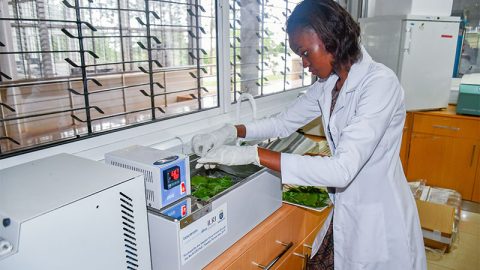
Welcome to the NM-AIST Laboratory, where we are dedicated to providing high-quality, reliable analytical services tailored to meet the needs of our diverse clients—including students, researchers, staff, and the wider community. Focusing on quality, safety, and professionalism, we support investigations across critical areas such as molecular and microbiological analysis, environmental science, water analysis, food safety, biochemical studies, energy, materials, and telecommunications.
Our lab strictly complies with ISO/IEC 17025 standards, ensuring that every test meets international benchmarks for accuracy and reliability. By continually advancing our methodologies and adopting best practices, we strive to offer dependable results that empower scientific research, promote innovation, and support sustainable development across Tanzania.
Soil Analysis Section
The soil section is one of the growing laboratory sections at NM-AIST, offering rapid analysis of soil, plants, and agricultural inputs such as manure and fertilizers using dry chemistry methods and wet chemistry. We provide soil analytical services to clients from different fields.
Energy Section
In an energy lab, students and researchers engage in a wide range of activities that encompass both experimental and theoretical approaches to understanding Energy of materials and energy utilization.
Materials Section
The materials laboratory section of the NM-AIST laboratory unit deals with state-of-the-art materials characterization. We specialize in providing comprehensive solutions tailored to meet the needs of Students, researchers, engineers, and manufacturers across various industries.
Water Analysis Section
The water analysis section is extensively dedicated to analysing water and wastewater. We analyse the chemical and physical parameters of water and wastewater for various clients. Our section plays a critical role in assessing water quality and ensuring safety for various applications, including drinking water, industrial processes, and environmental monitoring. We employ advanced techniques and equipment to analyse samples and provide reliable results.
Microbiology Section
The microbiology section offers services to researchers, students, and other clients outside the institution. It is dedicated to delivering reliable microbiology testing and research services that support safe, healthy, and sustainable environments.
Tissue culture Section
The tissue culture section offers services for in vitro preservation and proliferation of isolated plant cells, tissues, or organs on a designed sterile synthetic medium supplemented with nutrients and growth factors under controlled temperature, light, and humidity conditions.
These conditions include chemical, physical, and sometimes biological factors exposed by the plant material. Briefly, chemical factors include macro and micronutrients, carbon sources, plant growth regulators, and gelling agents. These components provide all the necessities of the plant cells to grow and differentiate into various organs. Physical factors are the pH of the medium, light intensities, temperature, humidity of the culture vessel and culture room, and the rate of gas exchange during nourishment of the plant cell.
Molecular Biology Section
The Molecular Biology section is dedicated to providing a range of services that support researchers, students, and various clients while advancing research and development across different sectors. We utilize key techniques such as Real-Time Polymerase Chain Reaction (RT-PCR), conventional PCR for DNA and RNA amplification, isothermal amplification, and gel electrophoresis for the detection and quantification of PCR products.
Food and Nutrition Section
Food and Nutrition section is committed to advancing food safety and nutritional quality through cutting-edge technology and a team of skilled professionals. We provide accurate, reliable testing services to address the unique needs of our community. Our customizable packages are designed to meet specific client needs, including research, food safety compliance, and product development. We ensure each package is tailored to support our clients in achieving high standards of quality and innovation.
Bioprospecting Section
A bioprospecting laboratory is a specialized research facility focused on exploring natural resources, primarily plants, microbes, and marine organisms, to identify and isolate compounds with potential applications in Food, Medicine, Agriculture, Cosmetics, and Industry. The Isolated compounds can be formulated for commercialization.
Equipment Maintenance Section
The laboratory Equipment Maintenance section refers to activities performed to ensure the equipment is in good working condition and operating safely. This includes regular equipment calibration, cleaning, lubrication, inspection, testing, and repair.
Electronics and Telecommunications Section
An Electronics and Telecommunication section is a specialized facility designed to support the study, research, and practical application of electronics and telecommunications technologies. The section serves as a hands-on environment for students and researchers to explore concepts in electronics, circuit design, communication systems, and signal processing. It is equipped with various tools and instruments that facilitate experimentation, prototyping, and testing of electronic devices and telecommunication systems.
Computer and Networking Section
The Computer and Networking section emphasizes the foundational concepts and technologies related to computer systems, networking, and data communication. This field offers students and researchers practical experiences in configuring, overseeing, and resolving issues within computer networks and systems. It covers different fields such as computer hardware and software, Network configuration and Management, Cloud computing, and Cybersecurity.
| Section | Service |
Food and Nutrition Section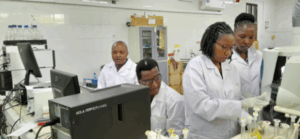 |
|
Soil Section
|
|
Energy Section
|
|
Materials Section
|
|
Molecular Biology Section
|
|
Tissue Culture Section
|
|
Microbiology Section
|
|
Bioprospecting Section
|
|
| Water analysis section |
|
Equipment Maintenance Section |
|
| Electronics and Telecommunications Section |
|
| Computer and Networking Section |
|
A LIST OF MEDIUM TECHNOLOGY, FIELD EQUIPMENT AND HIGH TECHNOLOGY EQUIPMENT IN OUR LABORATORIES
MEDIUM TECHNOLOGY
- Soil scanner
- Photometer 7100 and 7500
- DR 6800 spectrophotometer
- Fluoride coupled with PH meter
- BOD ox top machines
- Conversional PCR
- Autoclave machine
- Nano drop machine
- UV-VIS Spectrophotometer
- Incubator (humid CO2 incubator)
- Full Automated Solid-Liquid extraction system
- Thermo Gravometric Analyzer (TGA)
- Viscometer (digital)
- Benchtop DR 6000 Spectrophotometer
FIELD EQUIPMENT
- Multi parameters
- Soil augers
- Soil core ring set
- SEBA-Hydrometer-measuring speed of water in the rivers
- Water level meter
- Water sampling boat
- Aqua flour meter
HIGH TECHNOLOGY EQUIPMENT
- ICP-MS
- ICP-OES
- CHNS/O
- WD-XRF
- XRD
- RT- PCR
- GCMS/MS
- LCMS/MS
- HPLC
- Flow cytometer
(i) NM-AIST students and staff have access to use the laboratory from 8:00am to 4:00pm Monday to Friday – standard working hours
(ii)Students working in the laboratory must be affiliated to academic staff at the department, and they have the responsibility to make such agreements in advance.
(iii)The laboratory is also available to external researchers during the aforementioned hours as approved and communicated by head of department of the respective school and acknowledged by the laboratory manager
(iv)At all times when the laboratory is in use, laboratory personnel(s) must be available, for assistance and control
(v)Any exception granted to the aforementioned laboratory access guideline, must be justified and abide to the guideline for laboratory access.
(vi)Whenever access is required before and/or after the standard working hours, it MUST be communicated in advance to the responsible personnel and be approved following the proper chain of command, i.e. approved by head of department and facilitated by human resources for over time/extra duty documentation, appropriate compensation for Laboratory personnel is a MUST.
These individuals/groups may fall in four categories as defined below;
a) NM-AIST students: Masters, PhD, volunteers and field attached students.
b) NM-AIST employees: permanent and temporary
c) External users: Researchers/ Collaborators
d) Visitors

 Laboratory Sections
Laboratory Sections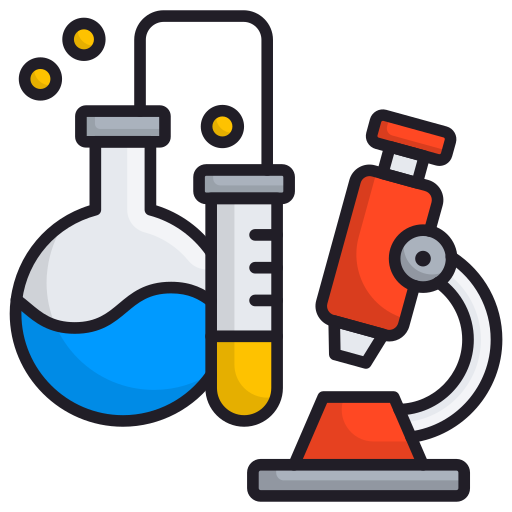 Laboratory Services
Laboratory Services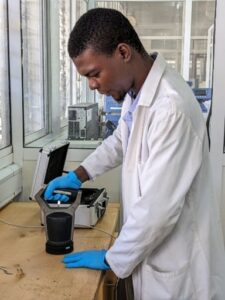
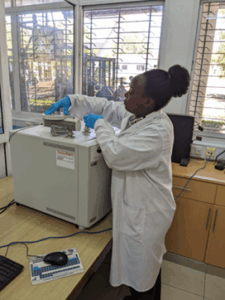
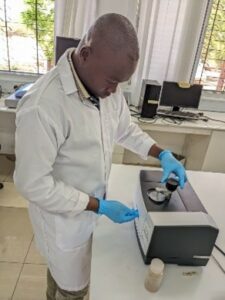
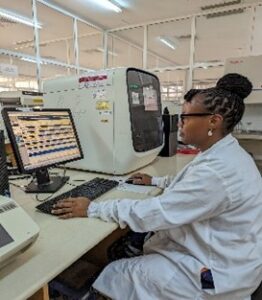
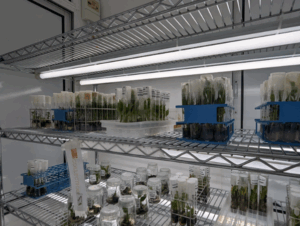
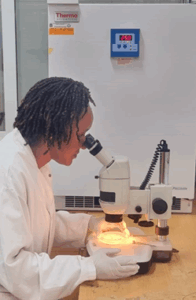
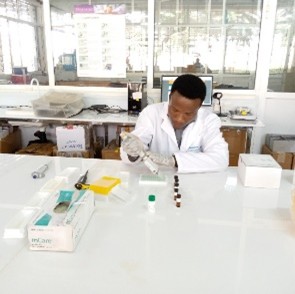





 Visit Today : 717
Visit Today : 717 Visit Yesterday : 1636
Visit Yesterday : 1636 This Month : 29390
This Month : 29390 This Year : 99894
This Year : 99894 Total Visit : 787160
Total Visit : 787160